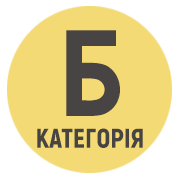THE ACTIVITIES OF THE YELISAVETGRAD PUBLIC TALMUD-TORAH 1858–1917
DOI:
https://doi.org/10.32782/cusu-hist-2024-2-7Keywords:
charity, Jewish community, Jewish Colonial Society, box collection, material aid, items, craft school, charter, Sabbath school, Talmud-TorahAbstract
The article is devoted to the study of little-known pages of the educational life of the Jewish population on the territory of the city of Yelysavetgrad, Kherson province (modern Kropyvnytskyi, Kirovohrad region). Among the institutions that legally provided the educational needs of the Jewish national minority was Yelisavetgrad Public Talmud-Torah. The Jewish community has made a lot of efforts for developing education. It managed to form the whole network of educational institutions. It strove to create favorable educational environment for its children without discrimination on the part of non-Jewish people, in which they gave knowledge and also helped the poorest with food and clothing. In general, the “cult of education” was widespread among Jews. It is not surprising, because the availability of education was a matter of survival and the possibility of acquiring a proper status in the society and a decent standard of living. Jews had a chance to enter higher educational institutions only if they had finished high school and it was a way to avoid serving in the army or since 1861 leaving the strip of settlement. Since 1865, Jewish artisans have been able to travel abroad. Thus, the active development of Jewish educational institutions falls on the second half of the 19th century. Talmud-Torah had also to preserve the culture, language, knowledge of traditions and the following Judaism among the youngest representatives of Jewish society, to protect them from assimilation or fusion. It also aimed to provide craft education. A significant amount of archival material was used in the work. Due to the analysis, the activities of Talmud- Torah from the moment of its foundation were reconstructed. The features of the institution’s economic and educational activities, manifestations of bureaucratic indolence, issues of reorganization and renovation of buildings, bringing the premises into compliance with sanitary and hygienic norms were studied. The ways to ensure the funding of the institution were taken into consideration. Thus, a local research in the field of the history of pedagogy was conducted, that is related to the provision of knowledge to students of Jewish nationality.
References
Електронна єврейська енциклопедія. Єврейське колонізаційне товариство. URL: https://eleven.co.il/diaspora/public-organizations/11525/
Кизименко П., 2003. Пам’ять степів (історичні нариси із минулого Кіровоградщини). Кіровоград: Мавік.
Козир І. А. (ред.), 2012. Кіровоградщина. Історія рідного краю. Кіровоград.
Мельник І., 2014/2015. Освіта єврейського населення Умані в ХІХ – на початку ХХ ст. Гуржіївські історичні читання. Випуск 8/9.
Пахолівецький В., 2023. Діяльність Єлисаветградської громадської Талмуд-Тори 1858–1917 років.
Проблеми історичної регіоналістики та мікроісторії : збірник тез Всеукраїнської наукової конференції з нагоди 175-ї річниці від дня народження П. Рябкова та 65-ї річниці від дня народження С. Шевченка, м. Кропивницький, 18–19 жовтня 2023 року. Кропивницький: РВВ ЦДУ ім. В. Винниченка. С. 47–49.
Пашутін О., 1992. Історичний нарис м. Єлисаветграда, надруковане за оригіналом 1897 року. Кіровоград.
Щупак И., 2015. Евреи в Украине: Вопросы истории и религии с древнейших времен до Холокоста: Учебное пособие для учащихся старших классов среднеобщеобразоват. учеб. заведений. Днепропетровск: Украинский институт изучения Холокоста «Ткума».








